
views
Giving Yourself the Advantage

Prepare as much as possible beforehand. Some lecturers hand out outlines of their lectures before they begin. Skimming the outline and considering your general thoughts about each topic will warm up your brain. Make sure you do any assigned reading for the lecture before class so that you can familiarize yourself with the topic before the lecture begins. Although it takes time, it really helps to look over the material of the lecture before the lecture. Becoming familiar with the material before the lecture can help you focus on what you have the most difficulty understanding, and you will be able to ask better questions during class.

Sit in the front. Try to sit in the front seats during lectures. Sit in the position where the lecturer can easily see your preparation of notes. This will propel you to prepare better notes, record more points, and will give you a better reputation in the class from the start. If you sit in the front, you will have fewer distractions and will be able to focus on the lecture.

Stretch and stay hydrated. If you find yourself getting tired during a lecture, stretch a little. Stretch your fingers, your arms, your legs, whatever is comfortable and appropriate given the space. Having water to drink at intervals will also help to keep you alert. Make sure you don’t disrupt the rest of the class by stretching or moving around too much.

Find a study buddy. Locate someone in your lecture who takes very good notes, or has a reputation for organization and academic achievement. See if you can meet with them for five or ten minutes after each lecture to go over their notes and discuss the content. Looking at a model of good note-taking will help you catch unclear or missing information in your own notes. You can also try to sit with your buddy during lectures. This will help you follow their good example of note taking and listening instead of getting distracted.
Taking Notes While You Listen
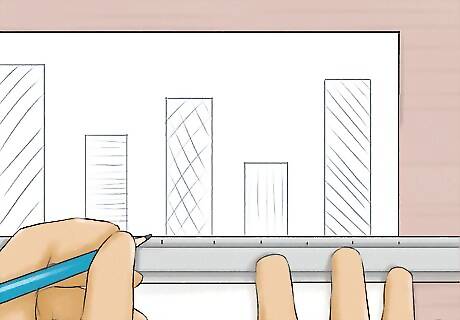
Use the type of notes that help you learn best. Some people are visual learners, and might benefit from drawing or making diagrams. Other people are auditory learners, and may find it most helpful to record a lecture and listen to it while studying. Find what style works best for you so you can take the most effective notes. For instance, visual learners could make a bubble map or draw symbols to represent important concepts.
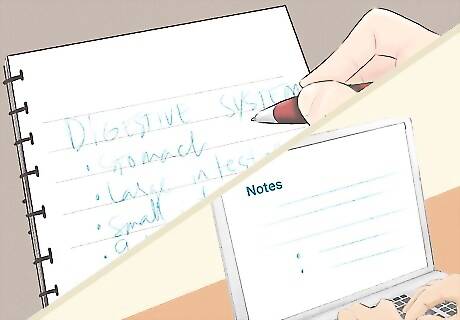
Find out if writing notes by hand or typing them works best for you. Some people find that writing notes by hand helps them remember the information better. Other people prefer typing their notes as they can do it more quickly and record more information. Try doing both to see which is most effective for you. Avoid using a computer if you tend to get distracted by social media or searching the web.
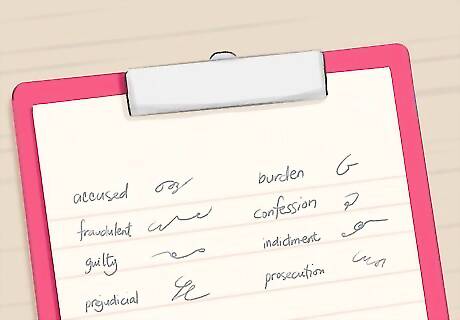
Develop your shorthand. Rather than writing complete sentences, or even complete words, create a form of shorthand to make note-taking easier. This will help you to take note quickly and keep up with the lecture, rather than trying to transcribe everything the professor or speaker says. Make sure that you’ll be able to understand your notes later!

Jot down main ideas. It is important to write down key points from the lecture. This does not mean writing everything word for word. It means that you need to focus on the most meaningful information, namely drawing out the points that matter and the points that sum up the gist of each section of the lecture. Focus on key ideas, definitions, and descriptive phrases to help you remember the subject. For example, if the lecture is based on a specific battle in history, try to write down the date, the major players involved (who was fighting who, and who their leaders were), and the overall outcome of the struggle.
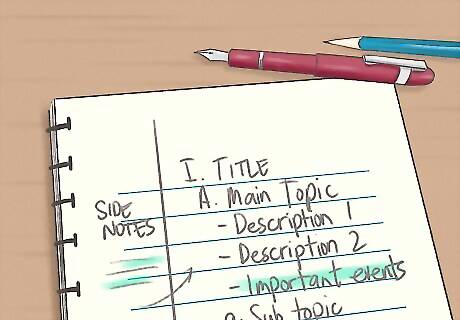
Take strategic notes. In the margin of your notes, write keywords or use signs that will draw you to the points quickly when you are re-reading the lecture notes. This does two things – it immediately creates a quick connection in your mind to the point and it makes it very easy to find the key points when you revise or write using the notes. If there is a handout for the lecture, try to highlight the important details. Come up with techniques for organizing different types of information. For example, you may underline names and dates, put stars next to definitions, or put boxes around example problems. This will help you reference quickly and better study for different types of tests.

Write questions as you listen. If you can formulate questions aimed at the subject matter as you are listening, this will help to solidify the information in your mind. Whether or not you get to ask these questions of the lecturer, you are learning a key skill that will be useful for the rest of your life. Asking questions enables you to explore the information further and forces you to examine the information you are receiving in a more active manner.
Listening Proactively

Stay focused. This means that you should try to remain alert and not wander off into a daydream, mentally creating a to-do list, or even outlining what you will write your next research paper on. Forget everything except what you are listening to and watching – devote all of your senses to the lecture. Being genuinely interested in the lecture subject will help you maintain the focus. If your mind starts to wander off-track, don’t give in to the temptation. Focus your energy back on the lecture and start writing notes to help you concentrate. Avoid distracting yourself during the lecture by browsing around on your computer or smart phone. Devote your attention solely to the lecturer.
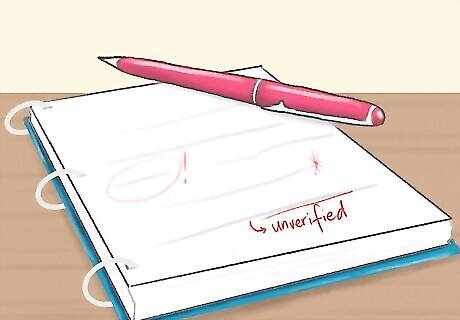
Decide if you agree with what is being said. If the lecturer makes points that you disagree with or find are worth further consideration, place an asterisk or exclamation marks next to the point and single-words such as "nonsense," "unverified," "explore further." This creates a connection in your mind with the possible further research avenues for you after the lecture. Questioning the research is a great way to solidify the information in your mind and propel you on to further study of the topic.
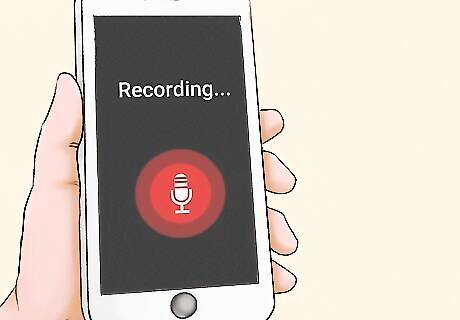
Use a recording device. If you are allowed to record a lecture, use this to your advantage. It is a great way to have a backup in case you can’t understand your notes later or forgot just exactly what was said during the lecture. Keep the recording device on the edge of your desk so that the sound won’t be muffled, then use it later to refer back to the complete lecture. Remember that you should not record lectures unless you have been given express permission to do so by the person who will be speaking. You should also keep in mind that going back and listening to the entire lecture over again can be quite time consuming. It might be a better idea to focus your efforts on taking more effective notes.

Ask questions. If you want to make sure that you understood what the lecture was about, ask some questions at the end of the lecture. Raise your hand and ask for clarification on any specific points you were unclear about. You may also want to consider talking to the speaker after class to further clarify some of the details.




















Comments
0 comment